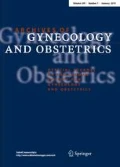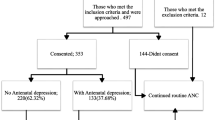Abstract
Purpose
Detection rates of depression in obstetric care are generally low, and many women remain undiagnosed and do not receive adequate support. In many obstetric settings, screening tools for depression are not applied routinely and there is a great need to sensitize health care professionals for the patient at risk for enhanced levels of depression. The present study aimed at identifying commonly assessed patient characteristics that are associated with antenatal depression.
Methods
One hundred and thirty seven women were screened using the Edinburgh Postnatal Depression Scale (EPDS) at the beginning of the second trimester at the outpatient department of a Tertiary University Hospital. Women were identified as at high risk for depression if scores were above a cut-off score of twelve. Obstetric history and outcome were extracted from patient files after delivery.
Results
Twenty one percent of the sample screened as depression positive. Logistic regression with backwards elimination showed that the triad of nausea during pregnancy, reports of (premature) contractions and consumption of analgesics during pregnancy significantly predicted high depression scores with a positive predictive value of 84.3%. The relative risk for a depressed pregnant woman to regularly take analgesics during pregnancy was fourfold higher than for non-depressed women.
Conclusions
If depression screening is not part of routine prenatal care, systematic assessment of depression should be targeted for patients presenting with the markers identified in this study.
Similar content being viewed by others
References
Heron J, O’Connor TG, Evans J, Golding J, Glover V (2004) The course of anxiety and depression through pregnancy and the postpartum in a community sample. J Affect Disord 80:65–73
Bennett HA, Einarson A, Taddio A, Koren G, Einarson TR (2004) Prevalence of depression during pregnancy: systematic review. Obstet Gynecol 103:698–709
Kammerer M, Marks MN, Pinard C, Taylor A, von Castelberg B, Kunzli H, Glover V (2009) Symptoms associated with the DSM IV diagnosis of depression in pregnancy and post partum. Arch Womens Ment Health 12:135–141
Cox JL, Holden JM, Sagovsky R (1987) Detection of postnatal depression. Development of the 10-item Edinburgh postnatal depression scale. Br J Psychiatry 150:782–786
Smith MV, Rosenheck RA, Cavaleri MA, Howell HB, Poschman K, Yonkers KA (2004) Screening for and detection of depression, panic disorder, and PTSD in public-sector obstetric clinics. Psychiatry Serv 55:407–414
Cepoiu, M, McCusker J, Cole MG, Sewitch M, Belzile E, Ciampi A (2007) Recognition of depression by non-psychiatric physicians—a systematic literature review and meta-analysis. J Gen Intern Med
Alder J, Fink N, Bitzer J, Hosli I, Holzgreve W (2007) Depression and anxiety during pregnancy: a risk factor for obstetric, fetal and neonatal outcome? A critical review of the literature. J Matern Fetal Neonatal Med 20:189–209
Zuckerman B, Amaro H, Bauchner H, Cabral H (1989) Depressive symptoms during pregnancy: relationship to poor health behaviors. Am J Obstet Gynecol 160:1107–1111
Andersson L, Sundstrom-Poromaa I, Bixo M, Wulff M, Bondestam K, aStrom M (2003) Point prevalence of psychiatric disorders during the second trimester of pregnancy: a population-based study. Am J Obstet Gynecol 189:148–154
Andersson L, Sundstrom-Poromaa I, Wulff M, Astrom M, Bixo M (2004) Implications of antenatal depression and anxiety for obstetric outcome. Obstet Gynecol 104:467–476
Larsson C, Sydsjo G, Josefsson A (2004) Health, sociodemographic data, and pregnancy outcome in women with antepartum depressive symptoms. Obstet Gynecol 104:459–466
Chung TK, Lau TK, Yip AS, Chiu HF, Lee DT (2001) Antepartum depressive symptomatology is associated with adverse obstetric and neonatal outcomes. Psychosom Med 63:830–834
Kelly RH, Russo J, Katon W (2001) Somatic complaints among pregnant women cared for in obstetrics: normal pregnancy or depressive and anxiety symptom amplification revisited? Gen Hosp Psychiatry 23:107–113
Field T, Miguel AD, Dieter J, Hernandez-Reif M, Schanberg S, Kuhn C, Yando R, Bendell D (2001) Depressed withdrawn and intrusive mothers’ effects on their fetuses and neonates. Infant BehavDev 24:27–39
Kurki T, Hiilesmaa V, Raitasalo R, Mattila H, Ylikorkala O (2000) Depression and anxiety in early pregnancy and risk for preeclampsia. Obstet Gynecol 95:487–490
Qiu C, Sanchez SE, Lam N, Garcia P, Williams MA (2007) Associations of depression and depressive symptoms with preeclampsia: results from a Peruvian case–control study. BMC Womens Health 7:15
Perkin MR, Bland JM, Peacock JL, Anderson HR (1993) The effect of anxiety and depression during pregnancy on obstetric complications. Br J Obstet Gynaecol 100:629–634
Wu J, Viguera A, Riley L, Cohen L, Ecker J (2002) Mood disturbance in pregnancy and the mode of delivery. Am J Obstet Gynecol 187:864–867
Field T, Diego M, Hernandez-Reif M, Schanberg S, Kuhn C, Yando R, Bendell D (2003) Pregnancy anxiety and comorbid depression and anger: effects on the fetus and neonate. Depress Anxiety 17:140–151
Dieter JN, Field T, Hernandez-Reif M, Jones NA, Lecanuet JP, Salman FA, Redzepi M (2001) Maternal depression and increased fetal activity. J Obstet Gynaecol 21:468–473
Monk C, Sloan RP, Myers MM, Ellman L, Werner E, Jeon J, Tager F, Fifer WP (2004) Fetal heart rate reactivity differs by women’s psychiatric status: an early marker for developmental risk? J Am Acad Child Adolesc Psychiatry 43:283–290
Steer RA, Scholl TO, Hediger ML, Fischer RL (1992) Self-reported depression and negative pregnancy outcomes. J Clin Epidemiol 45:1093–1099
Hoffman S, Hatch MC (2000) Depressive symptomatology during pregnancy: evidence for an association with decreased fetal growth in pregnancies of lower social class women. Health Psychol 19:535–543
Orr ST, James SA, Blackmore Prince C (2002) Maternal prenatal depressive symptoms and spontaneous preterm births among African–American women in Baltimore, Maryland. Am J Epidemiol 156:797–802
Andersson L, Sundstrom-Poromaa I, Wulff M, Astrom M, Bixo M (2004) Neonatal outcome following maternal antenatal depression and anxiety: a population-based study. Am J Epidemiol 159:872–881
Dayan J, Creveuil C, Marks MN, Conroy S, Herlicoviez M, Dreyfus M, Tordjman S (2006) Prenatal depression, prenatal anxiety, and spontaneous preterm birth: a prospective cohort study among women with early and regular care. Psychosom Med 68:938–946
Misri S, Oberlander TF, Fairbrother N, Carter D, Ryan D, Kuan AJ, Reebye P (2004) Relation between prenatal maternal mood and anxiety and neonatal health. Can J Psychiatry 49:684–689
Murray L, Carothers AD (1990) The validation of the Edinburgh Post-natal Depression Scale on a community sample. Br J Psychiatry 157:288–290
Matthey S, Henshaw C, Elliott S, Barnett B (2006) Variability in use of cut-off scores and formats on the Edinburgh postnatal depression scale: implications for clinical and research practice. Arch Womens Ment Health 9:309–315
Buist AE, Barnett BE, Milgrom J, Pope S, Condon JT, Ellwood DA, Boyce PM, Austin MP, Hayes BA (2002) To screen or not to screen—that is the question in perinatal depression. Med J Aust 177(Suppl):S101–105
Jesse DE, Graham M (2005) Are you often sad and depressed? Brief measures to identify women at risk for depression in pregnancy. Am J Matern Child Nurs 30:40–45
Field T, Hernandez-Reif M, Diego M (2006) Risk factors and stress variables that differentiate depressed from nondepressed pregnant women. Infant Behav Dev 29:169–174
Zayas LH, Cunningham M, McKee MD, Jankowski KR (2002) Depression and negative life events among pregnant African-American and Hispanic women. Women‘s Health Issues 12:16–22
Lindgren K (2001) Relationships among maternal-fetal attachment, prenatal depression, and health practices in pregnancy. Res Nurs Health 24:203–217
Diego MA, Jones NA, Field T, Hernandez-Reif M, Schanberg S, Kuhn C, Gonzalez-Garcia A (2006) Maternal psychological distress, prenatal cortisol, and fetal weight. Psychosom Med 68:747–753
Bergant AM, Nguyen T, Heim K, Ulmer H, Dapunt O (1998) German language version and validation of the Edinburgh postnatal depression scale. Dtsch Med Wochenschr 123:35–40
Flynn HA, Walton MA, Chermack ST, Cunningham RM, Marcus SM (2007) Brief detection and co-occurrence of violence, depression and alcohol risk in prenatal care settings. Arch Women‘s Ment Health 10:155–161
Alder J, Fink N, Lapaire O, Urech C, Meyer A, Bitzer J, Hosli I, Holzgreve W (2008) The effect of migration background on obstetric performance in Switzerland. Eur J Contracept Reprod Health Care 13:103–108
Seng JS, Low LK, Ben-Ami D, Liberzon I (2005) Cortisol level and perinatal outcome in pregnant women with posttraumatic stress disorder: a pilot study. J Midwifery Women‘s Health 50:392–398
Leigh B, Milgrom J (2007) Acceptability of antenatal screening for depression in routine antenatal care. Aust J Adv Nurs 24:14–18
ACOG (2006) Committee Opinion No. 343: psychosocial risk factors. Perinatal screening and intervention. Obstet Gynecol 108:469–477
Austin MP, Priest SR, Sullivan EA (2008) Antenatal psychosocial assessment for reducing perinatal mental health morbidity. Cochrane Database Syst Rev CD005124
Muzik M, Marcus SM, Heringhausen JE, Flynn H (2009) When depression complicates childbearing: guidelines for screening and treatment during antenatal and postpartum obstetric care. Obstet Gynecol Clin N Am 36:771–788, ix–x
Grote NK, Bridge JA, Gavin AR, Melville JL, Iyengar S, Katon WJ (2010) A meta-analysis of depression during pregnancy and the risk of preterm birth, low birth weight, and intrauterine growth restriction. Arch Gen Psychiatry 67:1012–1024
Conflict of interest
None.
Author information
Authors and Affiliations
Corresponding author
Rights and permissions
About this article
Cite this article
Alder, J., Fink, N., Urech, C. et al. Identification of antenatal depression in obstetric care. Arch Gynecol Obstet 284, 1403–1409 (2011). https://doi.org/10.1007/s00404-011-1872-3
Received:
Accepted:
Published:
Issue Date:
DOI: https://doi.org/10.1007/s00404-011-1872-3




